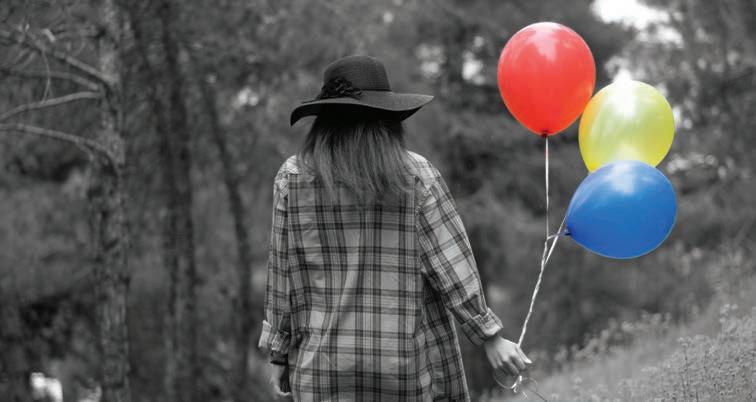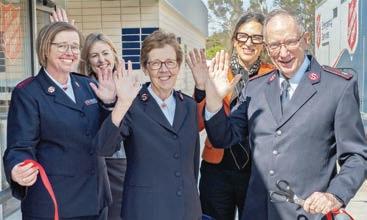

THE POWER OF JOY

“It’s not what you look at that matters, I t’s what you see.”
– Henry David t horeau
PHOTO BY DAVID CLODE ON UNSPLASH
What is The Salvation Army?
The Salvation Army, an international movement, is an evangelical part of the universal Christian Church.
Vision Statement
Wherever there is hardship or injustice, Salvos will live, love and fight alongside others to transform Australia one life at a time with the love of Jesus.
Mission Statement
The Salvation Army is a Christian movement dedicated to sharing the love of Jesus by:
• Caring for people
• Creating faith pathways
• Building healthy communities
• Working for justice
The Salvation Army Australia acknowledges the Traditional Owners of the land on which we meet and work and pay our respect to Elders, past, present, and future. We value and include people of all cultures, languages, abilities, sexual orientations, gender identities, gender expressions, and intersex status. We are committed to providing programs that are fully inclusive. We are committed to the safety and wellbeing of people of all ages, particularly children.

Fully human
As we look around our troubled world, it can be easy to despair. How can we enjoy life’s happy moments and celebrate in any way, when so many people both near and far are suffering?
In this edition, we explore the paradox of living in a beautiful world where there is so much goodness and hope, but also wars, injustices, financial struggles and grief. As Anthony Hunt writes in our feature, “Life is both celebration and mourning … to embrace both is to live more fully human … Choosing joy doesn’t mean ignoring injustice or glossing over pain … It’s resistance to the pull of hopelessness.”
Scan here to connect with The Salvation Army services
Founders: William and Catherine Booth
Scan here to subscribe to Salvos Magazine
Salvation Army World Leaders: General Lyndon and Commissioner Bronwyn
Buckingham
Territorial Leader: Commissioner Miriam Gluyas
Secretary for Communications and Editor-In-Chief: Colonel Rodney Walters
Publications Manager: Cheryl Tinker Editor: Simone Worthing
Graphic Designer: Ryan Harrison
Cover Image: Photo by Devin Avery on Unsplash
Enquiry email: publications@salvationarmy.org.au
All other Salvation Army enquiries 13 72 58
Press date: 10 October 2025
Printed and published for The Salvation Army by Commissioner Miriam Gluyas at Focus Print Group, Chester Hill, NSW, Darug Nation lands.
For a growing number of us, hope is often hard to find. Lyn Edge writes about learning to live with disappointment while never losing hope. She emphasises that “hope is a verb” and bringing faith, community and action together can help grow hope.
In Faith Talk, Kirralee Nicolle sums it all up, writing about God’s constant goodness and dependability, regardless of the circumstances.
God and hope are everywhere – within the reach of us all.
For these stories and more, go to salvosonline.org.au
Simone Worthing Editor
JOY IS RESISTANCE
Choosing hope in a broken world
by Anthony Hunt
A few weeks ago, I was doomscrolling –a phrase we use for that late-night habit of endlessly swiping through social media or news feeds, consuming story after story of bad news, crises and outrage. It’s a strangely addictive cycle, but not often a joyful one.
In the middle of that spiral, I stumbled across a clip of stand-up comedian Sammy Obeid. He’s an American comic with Palestinian roots, carrying a razorsharp wit and able to find humour even in life’s tensions. Midway through a set, someone in the audience shouted, “Joy is resistance.”
Obeid paused, let the words hang, then grinned: “Yeah. I’ve even got merch that says, ‘Jokes are resistance.’”
That exchange hit me hard. Here was someone whose identity is tied to a people often associated in the headlines with conflict and suffering, still laughing –still finding joy. And an audience member reframed it as something much bigger – a deliberate act of defiance against despair.
Paradoxes
Most of us know this paradox. We live surrounded by beauty – the beaches, the bush, the easy warmth of an Australian summer’s evening – and yet, open the news and you’re quickly reminded that the world is hurting. War, injustice, costof-living pressures, fractured families, ecological strain.

The ancient writers of the Bible knew this same tension. One letter famously declares: “All around us we observe a pregnant creation. The difficult times of pain throughout the world are simply birth pangs” (Romans chapter 8, verse 22, The Message translation).
The world is both stunningly good and deeply broken. And we feel caught in the middle. Do we give in to the brokenness? Or pretend everything is fine? Or is there another way?
PHOTO BY YUYANG LIU ON UNSPLASH
A different way
One of the most striking voices on this question is Paul, an early Christian leader whose life was anything but easy. Paul wrote many of his letters while imprisoned or persecuted, yet one of his recurring themes is joy.
“Rejoice in the Lord always. Again I will say, rejoice!” he urged the church in Philippi (Philippians chapter 4, verse 4, New King James Version). Coming from a man writing in chains, those words sound almost absurd. Yet for Paul, joy wasn’t shallow cheerfulness. It was rooted in a deep trust that love and goodness ultimately have the last word.
He went further: “We even take pride in our problems, because we know that trouble produces endurance, endurance produces character, and character produces hope” (Romans chapter 5, verse 3-4, Common English Version).
This is why many Christians today can describe joy as resistance. It resists the pull of cynicism. It resists despair. It insists that even in the darkest times, light remains.
In the life of Jesus, we also see that joy and sorrow are not enemies but more like dance partners. Jesus was known for attending parties and feasts, telling stories about wedding banquets as glimpses of what God intends life to be like. Even his first miracle was at a wedding, turning water into wine (John chapter 2, verses 1-11), suggesting that even celebration itself is a sacred act.
Yet Jesus also wept. He cried over the death of a close friend (John chapter 11, verse 35). He mourned over the city of Jerusalem, lamenting its brokenness (Luke chapter 19, verse 41). He even told his followers: “You’re blessed when you feel you’ve lost what is most dear to you. Only then can you be embraced by the One most dear to you” (Matthew chapter 5, verse 4, The Message).
This paradox is central. Life is both celebration and mourning. To deny either is to deny reality. To embrace both is to live more fully human.
Defying despair
In our current climate – economic pressures, political divisions, ecological

PHOTO BY ALEX ALVAREZ ON UNSPLASH

anxieties – joy can feel like a luxury. But maybe, as that audience member shouted, joy is resistance.
Choosing joy doesn’t mean ignoring injustice or glossing over pain. It means refusing to let despair have the final word. It’s resistance to the pull of hopelessness.
And it doesn’t always look grand. Sometimes it’s the small acts that keep us human: sharing a meal with neighbours, volunteering at a local op shop, cheering your team at the footy, or laughing at a comedian’s joke. Sometimes joy is as simple as sitting with someone who is grieving, refusing to let them face sorrow alone.
As the writer and activist Cornel West once put it: “Our job is not to solve every problem in the world, but to do our part with grace, integrity and courage.” We may not be able to heal all wounds or end all wars. But we can resist despair by choosing to practise joy, hope and love where we are.
Joy and sadness
So perhaps the question is not, “How can we be joyful when the world is broken?” but rather, “Can we dare to be fully human by holding both joy and sorrow together?”
Joy can be real, even when brokenness is all around us. And brokenness can still be real, even in the middle of celebration. To live with both is not contradiction –it’s truth. It’s resisting the temptation to numb oneself with denial or drown in despair, to doomscroll the night away.
This paradox is at the heart of the story of Jesus – the cross and resurrection side by side, grief and joy inseparably linked. But even outside faith, the invitation is the same. To laugh without ignoring pain. To mourn without surrendering to hopelessness. To embrace life not as an either/or, but as an and/both.
That’s not naïve. It’s profoundly human. And maybe, that’s the kind of resistance our world needs most.
Captain Anthony Hunt is a Salvation Army officer (pastor) in Qld.
PHOTO BY BAHAREH MORADIAN ON UNSPLASH
More than bricks and mortar
After years of dreaming and careful planning, the Wonthaggi community in Victoria’s South Gippsland is celebrating the official opening of a new Salvation Army building.
“The building is not just for the Salvos,” said Wonthaggi Salvos leader Captain Amanda Hart. “It’s for the community, and we want it to be shaped by the voices of our community and those who call Wonthaggi home.”
The new building features a community hall, commercial kitchen, food pantry, several interview rooms and office spaces. The Salvos will also collaborate with other services in the area, including

Salvos leaders open the new building.
a new Orange Sky laundry pod where people can wash and dry their clothes.
The vision for the new building is that this will be a place where people are welcomed, supported and empowered, and lives are transformed with the love of Jesus.
Donations support women in crisis
A new partnership in Mackay, North Queensland, is helping strengthen support for The Salvation Army’s Samaritan House, which provides safe accommodation and critical services for women and children escaping domestic and family violence.
Recently, Dalrymple Bay Coal donated 10 mobile phones to Samaritan House, ensuring victim-survivors have access to safe, secure communication. These phones will play a vital role in helping women stay connected with support services, family and friends, while maintaining privacy and security.
“Having access to a safe phone can be life-changing for the women we support,” explained Samaritan House Manager,

Jules Kakono, Samaritan House Manager (left), and team, with donated phones.
Jules Kakono. “It means they can reach out for help, stay in contact with loved ones and move forward with more independence. We are incredibly grateful to Dalrymple Bay Coal for recognising this need and stepping in to provide such practical assistance.”
Hope is a verb
“May the God of hope fill you with all joy and peace in believing, so that by the power of the Holy Spirit you may overflow with hope.”
Romans chapter 15, verse 13
by Lyn Edge
Every day, the headlines remind us that forests are shrinking, minerals are running out, soils are losing their richness. We’re living in an age of scarcity. What once felt abundant – land, water, resources –now feels fragile and threatened.
But the real scarcity isn’t only in what we can see and touch. There’s a deeper resource slipping through our fingers, one just as essential: hope.
Recent findings from The Global Hope Project published by Tearfund reveal just how fragile this resource has become in Australia.
In 2024, almost one in four Australians described themselves as “hopeful” or “very hopeful” about the future of the world. Fast forward just one year, and that number has dropped to less than one in five. Even more sobering, 16 per cent now say they feel “no hope at all”.
Losing hope
Why is hope drying up?
One explanation is that we are living in a time of poly-crisis. We are experiencing the coming together of multiple crises with the effect that the whole is worse than the sum of its parts. This includes the overlapping weight of war, political instability, economic insecurity and climate disruption. These are some of the
“thieves of hope”. But you may have felt other thieves closer to home – anxiety, loneliness, fear.
For an article on hope, this has been a bit of a bleak start. So, let’s now ask if there is anything we can do about this growing scarcity of hope.
Dr. Martin Luther King Jr. once said, “We must accept finite disappointment but never lose infinite hope.” That’s where we begin.
Before we look at what helps hope grow, let’s define the term. Hope is not wishful thinking; it’s a confident expectation. And if that’s the case, then hope isn’t just something you have; it’s something you do. Hope is an action, not just a feeling.
Growing
hope
As Emma Wyndham Chalmers from Tearfund puts it: “Hope is not an ethereal concept. It’s boots-on-the-ground work. It’s action-oriented.”
If hope is a verb, then it is something we do. So, how do we “do hope”?
The research is clear: hope grows when three things come together – faith, community and action.
Hope through faith: People with an active spirituality are more hopeful. Faith gives purpose, meaning and a bigger
story to lean on. Church attendance, prayer and Christian practices all nurture hope. This is evidenced in the research where 33 per cent of people who are “very hopeful” attend church monthly, compared to only 15 per cent of those with no religious beliefs.
Hope through community: When asked “Can I make a difference?”, 40 per cent said yes. But when asked “Can we make a difference?” that number leapt to 72 per cent. There is power in togetherness. Hope multiplies in community.
Hope through action: Hope grows when we act. Not necessarily in grand, worldchanging ways, but in simple, faithful steps: doing what is possible, what is right in front of us, the next right thing.
A gift to share
So, we face the challenge together, trusting that we can make a difference,
because every action we take can be a step toward building a better future.
Unlike forests, minerals, and soils, hope doesn’t diminish when used. In fact, the more it’s practised, the more it multiplies. It thrives when shared, grows when expressed, and deepens when lived out.
So, let’s “do hope”. Let’s live it, speak it, and act it – together. Because hope is not just a feeling to hold onto; it’s a resource to be grown, a practice to be lived, and a gift to be shared.
Hope is a verb. Let’s do it together and watch it grow.
For the full report and resources on practising hope go to tearfund.org.au/ hope
Lieutenant-Colonel Lyn Edge is a Salvation Army officer (pastor) in NSW
God is real to me because …
by Kirralee Nicolle
God is real to me because I’ve never had to go searching for evidence of him. Even when I’ve been worn out by the performance of religion, driven mad by the confusion of voices all expressing that God fits within this box but not another, or simply tired of myself and my own inconsistencies, God has never obscured himself.
I don’t know if this is the experience of everyone who loves Jesus. I don’t want to assume that it is, because I know that pain and suffering can accompany even the most rejuvenating aspects of life such as close relationships, hobbies or rest, so why not faith also? But what I do know is that when anything within the culture surrounding God and Christianity has fallen short as a worthy place in which to place my faith and joy, God never has.
through lives and streets and laughter and weariness and sorrow and pleasure. Frankly, he’s everywhere.
I think humanity has spent all its time trying desperately to define God, to demonstrate a way to grasp him, and, in many ways, to control him and direct him in the ways we want him to go. But how can we fully capture such profound goodness?
God is real to me because I’ve never had to go searching for evidence of him.
In fact, I would go so far as to say that God has been unavoidable for me. Rarely have I found God in worship music or smoke machines or raised hands and closed eyes, although those are definitely places you might find him. More often, I’ve found God in tear-stained cheeks and slight smiles, in dappled sunlight and cracked concrete. God shows up in the bird on my windowsill as much as he does in the face of a family member who has died. God is in brief and fleeting moments, and he’s also in a soft thread that weaves
It is God who convinces me to hold my tongue when I am about to judge someone and to regret it when I do. He has taught me to hold space for a new point of view or let go of my deeply held assumptions. Not because it would be shameful to disobey, but because the God I know is so content with mystery that if I am following in his way, then I ought to be as well.
For these reasons and many more, God only becomes more real to me with each day that passes. There are so few guarantees in life, and God’s presence is one on which I can depend.

PHOTO BY ENGUERRAND PHOTOGRAPHY ON UNSPLASH
THE GIFT OF JOY
Reflections on faith through life’s journey
by Belinda Davis
My faith journey started at birth when my mother’s obstetrician prayed over me. He thanked God for my safe arrival and asked for my life to be blessed by God, and to be a blessing to all those I encountered. When I first heard this story at the age of 24, my mum said, “I see this prayer coming true in you every day.”
I was born into a Christian family who were preparing to enter full-time ministry with The Salvation Army. Being part of church communities was the norm for me. I asked Jesus into my life when I was six years old and remember feeling so full of joy, I thought I would burst.
Sharing joy
Joy is something that I hold dear and try to share everywhere I go. The world can sometimes feel like such a dark place. In my chaplaincy work in a maximumsecurity men’s prison, I feel that my role as a joy-bringer is even more essential. It is a way I try to bring blessing to others.
From my early 20s, I felt a strong calling into full-time ministry myself, and eventually surrendered my life to God and entered ministry with The Salvation Army.
My training at theological college surrounded me with amazing teachers who encouraged me to grow and develop my skills and abilities. They challenged my thinking as the faith of my childhood needed to be wrestled with and formed into something that I could believe for myself. This was uncomfortable, and
difficult at times, and is something I need to keep doing as new situations arise.
Walking with others
This process also helped me identify my passion for sharing knowledge and teaching people as they navigate life. I love to explore biblical teachings, hear others’ interpretations and share what I see as well. I love spending time with people and hearing about their life. Being present and included in their journey is such a privilege.
Regular encounters with people with mental health struggles, those under the influence of a variety of substances, families in traumatic situations, and natural disaster emergency relief efforts have not been uncommon in my ministry experience. I endeavour to face each of these with grace, knowing that God’s grace has been given to me, and it’s my job to share that grace with others.
One afternoon at church, a regular community member asked to use our shower. Ordinarily, this would not be a problem, but this time she was incredibly inebriated, and we do not allow showers in these circumstances. She complained that she just wanted to wash her hair, so I offered to do it for her. We set up our own version of a hairdressing station, and I shampooed her hair and worked conditioner through the tangles. By the end of the process, she left happy and satisfied. She passed away from complications from her alcohol addiction a couple of months later.

I do not share this story to selfaggrandise in any way, but to illustrate what motivates me in ministry. When asked by my staff why I did it, all I could say was, “I think Jesus would have offered to wash her hair.”
Hard times
My journey has not been all roses and sunshine. Life has thrown me some difficult curve balls – broken romantic relationships, including two engagements and one marriage; cancer death of my children’s seven-year-old half-sister; cancer diagnosis of my father-in-law and my father on the same day; domestic
violence intervention orders taken out against my ex-husband by police after being divorced for 12 years; deaths of both my parents to cancer.
These, and other events, cause wrestling, reflection and pain, but I am still held secure in my faith. I am grateful for God’s grace and comfort through all these times and the lessons I have learned through them all.
My faith journey is not over yet. What about yours?
Major Belinda Davis is a Salvation Army officer (pastor). She blogs at A-blessedlife.com
STOCK PHOTO: GETTY IMAGES
Cheese and tomato toastie

Ingredients
400g tomatoes; 4 garlic cloves; sprigs of thyme; 2 tbsp oil; salt and pepper to season; 30g mayonnaise; 4 thick sourdough slices; 150g cheese, grated Method
Roast chopped tomatoes at 220ºC.
Squash garlic and add to the tomatoes. Add thyme. Drizzle oil over the tomatoes and season. Roast for 25 minutes until lightly charred.
Mash peeled garlic into tomatoes. Cook for 15 minutes. Cool and remove thyme.
Spread mayonnaise over the outside of each slice of bread; spread tomatoes on the inside and top with cheese. Top with remaining slices.
Fry until golden.
Combination ideas: Goat’s cheese with apricot jam and thyme; Gouda cheese with chilli jam; Mozzarella and pesto; cheddar with bacon and caramelised onion.
Believe in Good: Tips
“Each day holds a surprise. But only if we expect it can we see, hear, or feel it when it comes to us. Let’s not be afraid to receive each day’s surprise, whether it comes to us as sorrow or as joy. It will open a new place in our hearts, a place where we can welcome new friends and celebrate more fully our shared humanity.”
–
Henri Nouwen
Quiz
1. John Montagu, the 4th Earl of Sandwich, is credited with inventing the sandwich in the 1760s. What was on the very first sandwich?
2. What famous song features a Vegemite sandwich?
3. What is the French term for a long, thin loaf of bread?
4. What is Paddington Bear’s favourite sandwich filling?
5. What is the filling for a BLT?
Tum-Tum

On which page of this week’s Salvos Magazine is Tum-Tum hiding?
Did you know?
During the Apollo 17 mission, astronaut Harrison Schmitt discovered an allergy to moon dust.
In New Delhi, the Sulabh International Museum of Toilets features toilets from 2500 BC to today. The youngest athlete to win an Olympic medal was a Greek gymnast finishing third at the 1896 Olympic Games. Dimitrios Loundras was 10 years old.
In Switzerland, it is illegal to own just one guinea pig, as they are highly social animals.
Black Sapote, a fruit from Central and South America, tastes like chocolate pudding.
✏Answers
Quiz: 1. Beef. 2. Down Under by Men at Work. 3. Baguette 4. Marmalade 5. Bacon, lettuce and tomato Tum-Tum: is hiding behind the phones on page 7.
�� Sudoku
Fill in the grid so that every row, every column and every 3x3 box contains the digits 1 to 9.
�� Have a laugh
What did one sandwich say to the other when they were in trouble?
Why did the sandwich go to the therapist?
Why did the sandwich go to the dentist?
Why do sandwiches love sitting near a fire?
You’re toast! It had a lot of layers to work through. It needed a filling. They like to feel toasty.
byte
“May the God of hope fill you with all joy and peace as you trust in him.”
Romans chapter 15, verse 13a New International Version

Please mark your calendars for these significant dates in the lives of our soon-to-becommissioned Cadets and Auxiliary Lieutenants:
PARRAMATTA: 23RD NOVEMBER
MACKAY: 7TH DECEMBER



